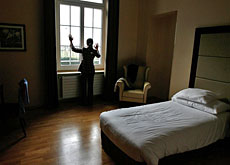Health reform plans hard to swallow

Voters face a difficult choice when they decide on the latest attempt to reform the Swiss health system, which is renowned for its high quality - and high costs.
The campaign ahead of the June 1 ballot and the proposal itself have left many citizens puzzled and experts guessing about the impact of the overhaul.
On the face of it the proposal, approved by parliament, is straightforward. It aims at more transparency and competition in health matters.
“The constitutional amendment gives a broad outline of the Swiss health system. It calls for quality, competition and upholds the principle of free choice. Nothing more and nothing less,” says Liberal parliamentarian Claude Ruey.
But the simplicity and vagueness of the proposal could also be its downfall at the ballot box.
Opponents argue it paves the way for health insurance companies to bolster their position against the other players in the health sector, particularly doctors and the country’s 26 cantons.
“We must not leave it to large private insurers to make choices at the expense of the state and without political controls,” says Jean-François Steiert of the Social Democratic Party.
His centre-left party has also warned of higher costs for patients and an end to unrestricted access to doctors.
Complex
What is more, the general public finds it difficult to understand the implications of the vote. Even Georg Lutz, political analyst at Lausanne University, is not really sure what is at stake.
“It seems to be strategic issues primarily. But it is not possible to assess the impact. The private sector hopes to win more, while the cantons fear to lose influence.”
The plan foresees simplifying the way hospitals are funded. Insurance companies would be put in charge of managing hospital care, including the SFr8 billion ($7.7 billion) annual subsidies from cantons.
The proposed amendment is the latest move in a long-running saga over rising health costs. Parliament has been trying to adapt legislation and the Swiss have been called to vote on health matters at least five times in the past decade.
Health is an area where major steps are no longer realistic, according to Lutz.
“It’s too complex and there are so many players and pressure groups involved. Chances are you lose if you have more than two opponents,” he told swissinfo.

More
Health insurance
In a rush
Indeed the supporters of the latest reform – notably health insurers and hospitals -face a formidable alliance of opponents.
These include two of the four main political parties, the cantonal authorities, the doctors’ association and health workers as well as patient’s organisations.
Lutz says the situation mirrors the parliamentary history of the proposal.
“It was drafted at very short notice and without the necessary involvement of all sides concerned,” he says.
The rightwing Swiss People’s Party initially forced a nationwide ballot on reducing medical services which are covered by mandatory insurance. It later withdrew the initiative, encouraging parliament to legislate last December in a bid to cut health costs.
The government’s stance has done little to convince voters. The cabinet was against a new amendment, but finally called on the electorate to approve it.
Interior Minister Pascal Couchepin, who is in charge of health matters, has made it obvious that he will not put his heart and soul into defending the amendment.
swissinfo, Urs Geiser and Olivier Pauchard
The June 1 vote is the sixth ballot on health reform in the past decade.
Previous proposals included an overhaul of the insurance system, financing of hospital and hospital care and the cost of medicines.
Two other issues will be decided by the Swiss in June 1: proposals on the citizenship procedure and the government’s information policy.
Switzerland has compulsory health insurance coverage, giving access to a broad range of medical services.
It also has the most expensive health system in Europe, according to an international comparison.
Switzerland spent 11.5% on health in 2005, ahead of Germany and France but behind the United States.
In 2005 the Swiss spent some SFr51.7 billion ($49.5 billion) on health.
About SFr7.5 billion went towards patient care, particularly for the elderly, of which 60% is paid by insurance, 20% by the state and 20% by individual patients.
The increase in health costs in Switzerland is above the average rate in other industrialised countries. 1990-2002: 2.4%; 2000-2005: 4.1%.
Around 428,000 people worked in Switzerland’s health sector in 2005. One in four was an immigrant.
The number of doctor’s practices has been on the increase since the 1990s and reached 2.08 per 1,000 inhabitants in 2006

In compliance with the JTI standards
More: SWI swissinfo.ch certified by the Journalism Trust Initiative













You can find an overview of ongoing debates with our journalists here . Please join us!
If you want to start a conversation about a topic raised in this article or want to report factual errors, email us at english@swissinfo.ch.